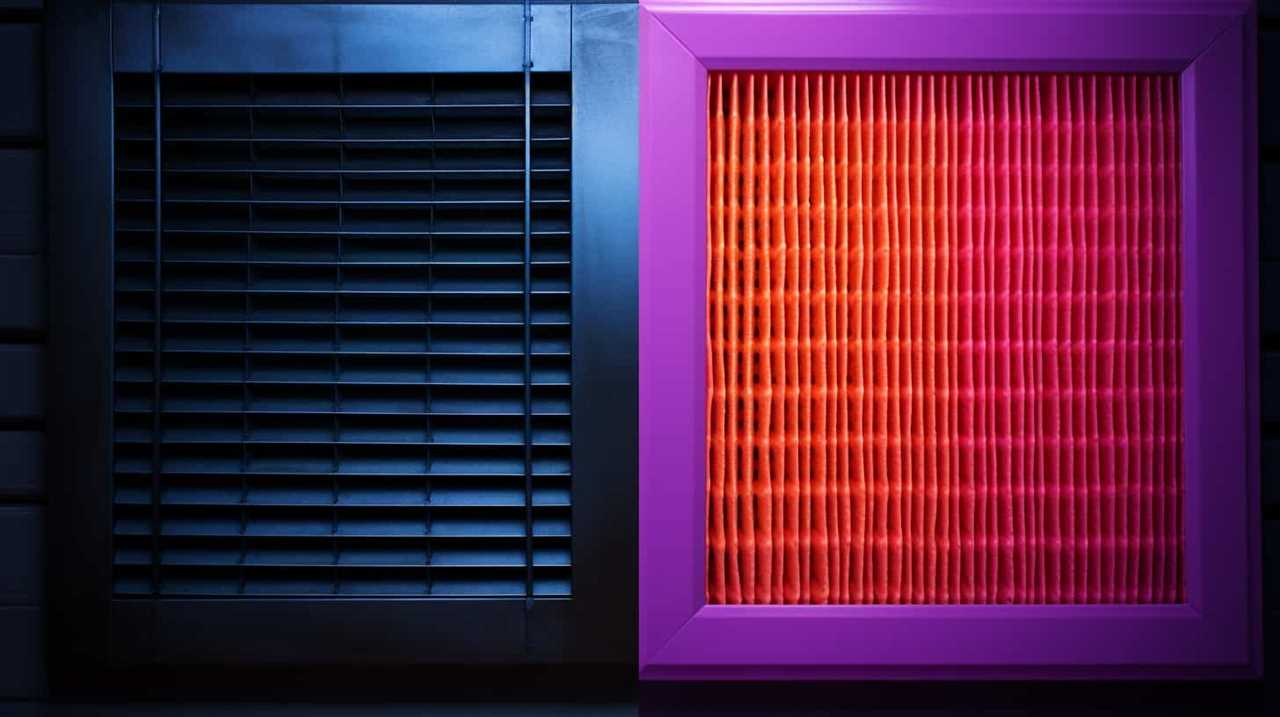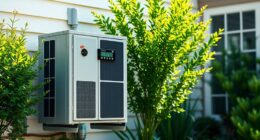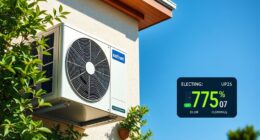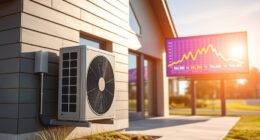Are you fed up with expensive energy bills and ineffective heating systems? We get it. But don’t worry, because we have the perfect solution for you: home heat pump systems.
In this article, we will explore the benefits, types, and factors to consider when choosing a heat pump system.
We’ll also delve into energy efficiency ratings, common issues, and maintenance tips.
So join us as we embark on a journey to discover the wonders of heat pump systems for a more energy-efficient home.

Key Takeaways
- Heat pump systems extract heat from a cold source and transfer it to a warm area, providing both heating and cooling.
- Heat pump systems are environmentally-friendly choices for homeowners, as they save energy and reduce greenhouse gas emissions.
- There are two main types of heat pump systems: geothermal heat pumps and air source heat pumps, each with their own advantages and considerations.
- Factors to consider when choosing a heat pump system include upfront cost, energy efficiency ratings, proper sizing, maintenance requirements, and environmental impact.
How Heat Pump Systems Work
We’ll now delve into how heat pump systems work to efficiently heat and cool homes.
Heat pump technology utilizes the principles of heat transfer mechanisms to achieve this. Heat pumps work by extracting heat from a cold source (such as the outside air or the ground) and transferring it to a warm area (like the inside of a house).
This process is achieved through the use of refrigerant, which absorbs heat as it evaporates and releases heat as it condenses. By reversing the flow of refrigerant, heat pumps can also provide cooling by removing heat from the inside and releasing it to the outside.
This efficient method of heating and cooling not only saves energy but also reduces greenhouse gas emissions, making it an environmentally-friendly choice for homeowners.

Benefits of Heat Pump Systems
One of the major benefits of heat pump systems is that they can provide both heating and cooling, making them versatile and efficient for maintaining a comfortable home environment. Here are three key benefits of heat pump systems:
-
Energy savings potential: Heat pump systems are highly energy efficient, as they transfer heat rather than generate it. This means they require less energy to provide heating or cooling compared to traditional HVAC systems. By using less energy, heat pump systems can help reduce utility bills and lower overall energy consumption.
-
Improved indoor air quality: Heat pump systems have built-in filters that help remove dust, pollen, and other allergens from the air, resulting in cleaner and healthier indoor air quality. This is particularly beneficial for individuals with allergies or respiratory conditions.
-
Environmentally friendly: Heat pump systems use environmentally friendly refrigerants and produce fewer greenhouse gas emissions compared to conventional heating and cooling systems. By choosing a heat pump system, homeowners can contribute to a greener and more sustainable future.

With their energy savings potential and other benefits, heat pump systems are an excellent choice for homeowners looking to create a comfortable and eco-friendly living space.
Types of Heat Pump Systems
When considering home heat pump systems, it’s important to understand the different types available and their respective benefits.
Two common types of heat pump systems are geothermal heat pumps and air source heat pumps. Geothermal heat pumps utilize the stable underground temperature to provide both heating and cooling for your home. This type of system is highly efficient and can save you money on your energy bills.
On the other hand, air source heat pumps extract heat from the air outside your home and transfer it inside. While they may not be as efficient as geothermal heat pumps, they’re more affordable and can still provide significant energy savings.
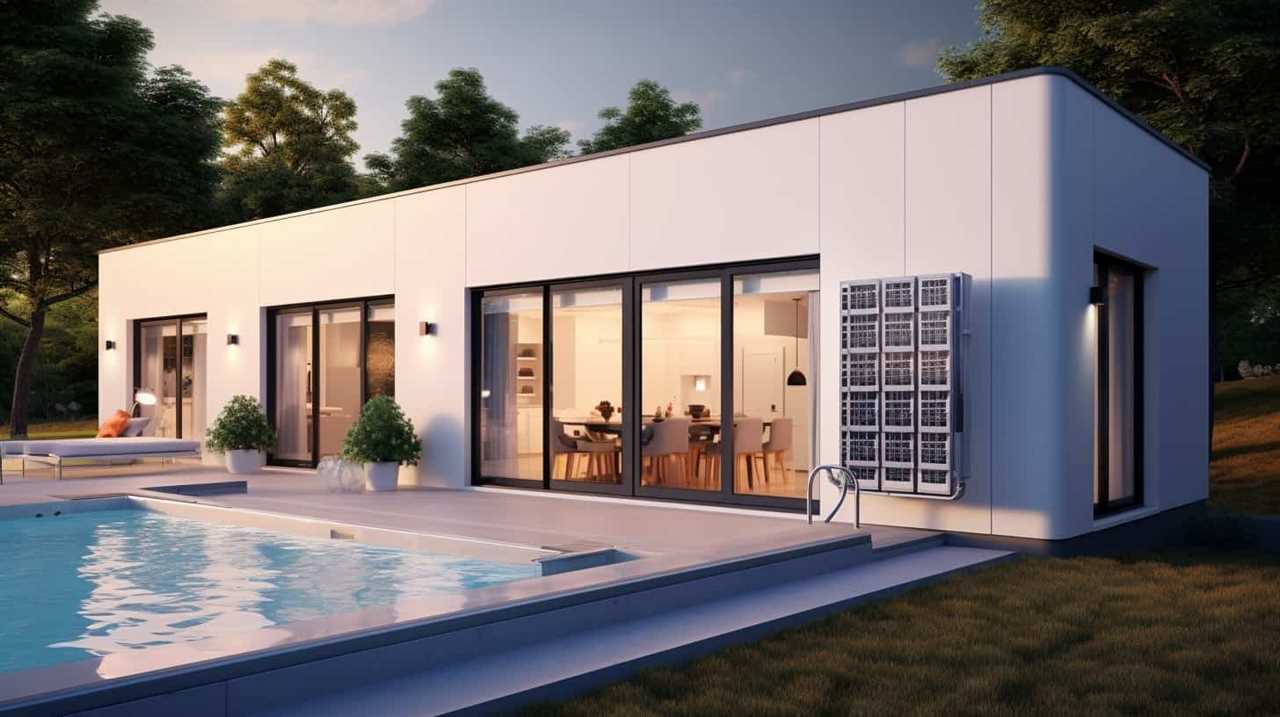
When choosing a heat pump system, it’s crucial to consider factors such as cost, climate, and the size of your home.
Factors to Consider When Choosing a Heat Pump System
Some important factors to consider when choosing a heat pump system are the upfront cost, the expected energy savings, and the size of our home. These factors can greatly impact our overall satisfaction and savings with the system. Here are three key considerations:
-
Upfront cost: It’s crucial to evaluate the initial investment required for purchasing and installing a heat pump system. Different models and brands come with varying price tags, so finding a system that fits our budget is essential.
-
Expected energy savings: Energy efficiency ratings play a significant role in determining the potential savings we can achieve with a heat pump system. Higher efficiency ratings mean lower energy consumption, resulting in reduced utility bills.

-
Size of our home: Choosing the right-sized heat pump is crucial for optimal performance. A system that’s too small will struggle to heat or cool our home adequately, while an oversized system will waste energy. Proper sizing ensures that our home remains comfortable and maximizes energy efficiency.
Considering these factors will help us make an informed decision when selecting a heat pump system.
Now let’s delve into energy efficiency ratings and standards to further enhance our understanding.
Energy Efficiency Ratings and Standards
By understanding energy efficiency ratings and standards, we can make informed decisions about the most efficient heat pump system for our home. Energy efficiency certifications play a crucial role in helping consumers identify products that are designed to save energy and reduce utility bills. When shopping for a heat pump system, it is important to look for certifications such as ENERGY STAR, which indicates that the product meets strict energy efficiency guidelines set by the Environmental Protection Agency. These certifications ensure that the heat pump system has undergone rigorous testing and meets high standards of performance. Investing in an energy-efficient heat pump system can have a significant impact on utility bills, as it can reduce energy consumption and lower costs in the long run.

| Certification | Description |
|---|---|
| ENERGY STAR | Meets strict energy efficiency guidelines set by the EPA |
| SEER | Seasonal Energy Efficiency Ratio measures cooling efficiency |
| HSPF | Heating Seasonal Performance Factor measures heating efficiency |
| EER | Energy Efficiency Ratio measures cooling efficiency at a specific temperature |
| COP | Coefficient of Performance measures heating efficiency at a specific temperature |
Understanding these certifications and their impact on energy consumption can help us choose a heat pump system that not only saves money but also reduces our carbon footprint.
Common Issues With Heat Pump Systems
We encountered a few common issues with our heat pump system, but we were able to address them quickly. Here are three troubleshooting techniques that helped us resolve these issues:
-
Insufficient Heating or Cooling: If your heat pump system isn’t providing enough warmth in winter or coolness in summer, check the thermostat settings and make sure they’re correctly programmed. Additionally, check the air filters and clean or replace them if necessary. Clogged filters can restrict airflow and affect system performance.
-
Frozen Coils: If you notice ice forming on the outdoor unit or reduced airflow, it could indicate frozen coils. This issue is often caused by dirty air filters, low refrigerant levels, or a malfunctioning defrost cycle. Clean the filters, ensure proper refrigerant levels, and consult a professional if the problem persists.

-
Strange Noises: Unusual noises like rattling, squealing, or grinding can indicate a mechanical problem. Check for loose or damaged components, tighten any loose screws, and lubricate moving parts. If the noise persists, it’s best to contact a qualified technician for further inspection.
By addressing these common issues promptly, you can ensure optimal performance and longevity for your heat pump system.
In the next section, we’ll provide some maintenance tips to help you keep your system running smoothly.
Maintenance Tips for Heat Pump Systems
Now that we’ve covered some common issues with heat pump systems, let’s talk about how we can maintain these systems to ensure their optimal performance.

Annual maintenance is crucial for heat pump systems, and it’s important to schedule regular inspections and tune-ups with a professional technician.
Additionally, there are some troubleshooting techniques that you can try yourself to address minor issues and avoid unnecessary expenses.
Annual Maintenance Requirements
Regularly maintaining your heat pump system is essential for optimal performance and energy efficiency. To ensure your system operates at its best, here is an annual maintenance checklist:
-
Clean or replace air filters: Dirty filters restrict airflow and reduce efficiency. Clean or replace them every three months.

-
Check refrigerant levels: Low refrigerant levels can lead to decreased cooling capacity and higher energy consumption. Have a professional inspect and recharge the refrigerant if necessary.
-
Clean the outdoor unit: Clear any debris, leaves, or vegetation around the outdoor unit. This ensures proper airflow and prevents damage to the system.
Regular maintenance helps prolong the lifespan of your heat pump system and keeps it running efficiently. By following these tips, you can save on energy costs and enjoy a comfortable home.
Now, let’s explore some DIY troubleshooting techniques to address common heat pump issues.

DIY Troubleshooting Techniques
How can we troubleshoot and maintain our heat pump systems effectively? When it comes to troubleshooting techniques for heat pump systems, there are a few common problems that homeowners may encounter. By understanding these issues and employing some basic maintenance tips, you can keep your heat pump running smoothly and efficiently. Here are some DIY troubleshooting techniques and common problems to be aware of:
| Common Problem | Troubleshooting Technique |
|---|---|
| Insufficient heating or cooling | Check air filters and clean or replace if necessary. Ensure that the thermostat is set correctly. Verify that the outdoor unit is not obstructed by debris. |
| Noisy operation | Inspect the outdoor unit for loose or damaged components. Lubricate the fan motor if needed. Contact a professional if the noise persists. |
| Frozen coils | Check the air filters and clean or replace as needed. Ensure that the outdoor unit is not blocked by snow or ice. If the problem persists, call a professional. |
| Inconsistent temperature | Check the thermostat settings and recalibrate if necessary. Inspect the air ducts for leaks or blockages. Consider upgrading insulation in your home. |
Cost and Return on Investment Analysis for Heat Pump Systems
When considering heat pump systems for our homes, it’s important to take into account the cost and potential return on investment.
The initial installation costs can vary depending on the size and efficiency of the system, but it’s crucial to consider the long-term financial benefits.
Heat pump systems have the potential to save us a significant amount of energy and money over time, making them a wise investment for energy efficiency.

Initial Installation Costs
We need to consider the initial installation costs when analyzing the cost and return on investment for home heat pump systems. While these systems are known for their energy efficiency and long-term savings, it’s important to understand the upfront expenses involved.
Here are three key factors to consider:
-
Installation time: The time it takes to install a heat pump system can vary depending on factors such as the size of your home and the complexity of the installation. It’s important to factor in any disruptions to your daily routine during the installation process.
-
Government incentives: Many governments offer incentives and rebates for homeowners who install energy-efficient heat pump systems. These incentives can help offset the initial installation costs and improve the overall return on investment.
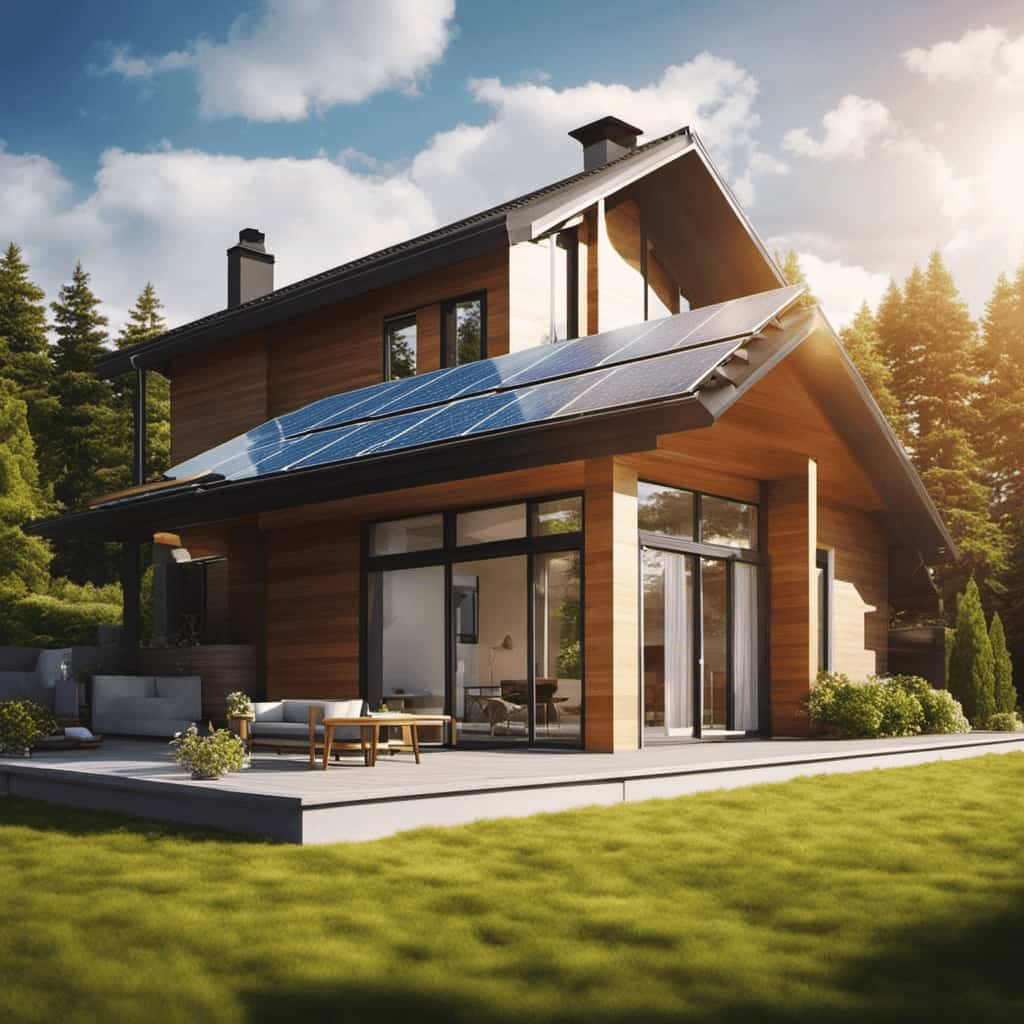
-
Long-term savings: Although the initial installation costs may seem high, heat pump systems can lead to significant long-term savings on energy bills. It’s important to consider the potential savings over the lifespan of the system when evaluating the return on investment.
Energy Savings Potential
To analyze the cost and return on investment for heat pump systems, we will examine the potential energy savings they offer. Heat pump systems are known for their energy efficiency, which can result in significant savings on utility bills. By using a heat pump, homeowners can reduce their reliance on traditional heating and cooling systems, which tend to be less efficient. This not only translates to lower energy costs but also has a positive environmental impact by reducing greenhouse gas emissions. To better understand the potential savings, let’s take a look at the table below, which compares the average annual energy costs for different heating and cooling systems:
| Heating/Cooling System | Average Annual Energy Cost |
|---|---|
| Heat Pump | $800 |
| Electric Furnace | $1,200 |
| Gas Furnace | $1,500 |
| Central AC | $1,000 |
| Window AC | $800 |
As you can see, heat pumps offer significant energy savings compared to other systems, making them a cost-effective and environmentally friendly choice for homeowners.
Long-Term Financial Benefits
Evaluating the cost and return on investment for heat pump systems, we’ll analyze their long-term financial benefits. When considering the financial planning of your home, it’s crucial to take into account the potential savings and return on investment that a heat pump system can provide.

Here are three key points to consider:
-
Energy Consumption Reduction:
Heat pump systems are known for their energy efficiency, which can lead to significant cost savings on your monthly energy bills. By utilizing renewable energy sources, such as air or ground heat, these systems can reduce energy consumption and decrease your reliance on traditional heating and cooling methods. -
Lower Maintenance and Operating Costs:
Heat pump systems require less maintenance compared to traditional heating and cooling systems. With fewer moving parts and simple operation, you can save on maintenance costs and extend the lifespan of your system. Additionally, the operating costs of heat pump systems are generally lower, resulting in long-term financial benefits. -
Potential Government Incentives:
Many governments offer financial incentives and tax credits for installing energy-efficient heat pump systems. These incentives can help offset the initial cost of installation, making the overall investment more affordable and attractive.
Frequently Asked Questions
Can a Heat Pump System Be Used to Cool a Home as Well as Heat It?
Yes, a heat pump system can be used to cool a home as well as heat it. This dual functionality increases energy efficiency and provides the benefits of both heating and cooling in one system.
Are There Any Government Incentives or Tax Credits Available for Installing a Heat Pump System?
Yes, there are government incentives and tax credits available for installing a heat pump system. These incentives and credits can help offset the cost of installation and make the switch to a more energy-efficient system more affordable for homeowners like us.
How Long Does a Typical Heat Pump System Last Before It Needs to Be Replaced?
Heat pump systems typically last around 15-20 years before needing replacement. However, regular heat pump maintenance and keeping an eye out for signs of system failure can extend the lifespan and ensure energy efficiency in your home.
Are There Any Special Requirements or Considerations for Installing a Heat Pump System in an Older Home?
When retrofitting a heat pump system in an older home, there are special considerations to keep in mind. We can help you navigate through the process and ensure a successful installation.

Can a Heat Pump System Be Integrated With Other Renewable Energy Sources, Such as Solar Panels?
Yes, a heat pump system can be integrated with other renewable energy sources, like solar panels. However, there may be integration challenges and it’s important to consider the cost effectiveness of such a system.
Conclusion
In conclusion, heat pump systems offer numerous benefits, such as energy efficiency and lower utility bills. With various types to choose from, it’s important to consider factors like size and climate before making a decision.
By looking for energy efficiency ratings and following maintenance tips, homeowners can ensure optimal performance. Despite common issues, the cost and return on investment analysis shows that heat pump systems are a worthwhile investment.
Ultimately, embracing this technology can lead to a more sustainable and comfortable home.



